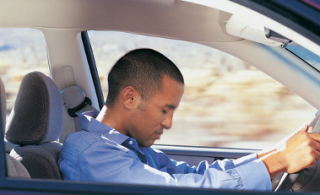Sleep
Don't Drive Drowsy!
How to recognize the signs of drowsy driving and what you can do to combat it
Posted March 8, 2013

Spring is almost here! This weekend, we are reminded to turn the clock forward and change the batteries in our smoke detectors. As important as those two items are, I'd like to also suggest that you also use this as a time to check in with your health, especially making sure that you're obtaining enough sleep (given that it is officially National Sleep Awareness Week!).
Drowsy driving is a major issue that the National Sleep Foundation is working hard to fight against, and they're using this week to try and bring more awareness to this problem. We are a sleep-deprived nation, and there's too many of us on the roads at times when we shouldn't be. Drowsiness and sleep deprivation can cause "microsleep" episodes for 2-3 seconds, with the driver often totally unaware that it happened. Reaction time, memory, attention, concentration and alertness are all compromised when we're drowsy.
Being awake for 17 hours straight leads to performance impairment equal to 0.05% blood alcohol content (0.08% or more is considered legally intoxicated). After 24 hours of being awake in a row, driving performance is equal to someone with a blood alcohol content of 0.10%.
Those who are at the greatest risk of drowsy driving are people who are sleep deprived, drive at night, drive long distances, work 60+ hours a week, drink alcohol, consume drugs (illegal and some prescribed/over-the-counter medications such as cold medications/antihistamines) or travel often.
You might be sleepy if you are doing any of the following: miss exits, can't focus, drift across lanes, rub eyes, daydream, yawn, roll down the window or turn up the radio to focus. If you aren't sure if you should drive, don't drive. Rolling down the windows and blasting the music generally don't help with drowsiness.
If you must drive, there's some techniques that can help reduce your risk of driving while drowsy. First and foremost - make sure you get adequate sleep on a nightly basis, at least for the week before a road trip. Ask someone to travel with you and take turns driving.
A brief 20-minute nap before leaving can be helpful as well as scheduling in a rest break every 2 hours or 100 miles. Make sure to avoid alcohol or any sedating medications. Caffeine can be used strategically. Before your drive, try consuming something with caffeine and taking a 20 minute nap. The caffeine will take 30 minutes to enter your bloodstream, so you're getting a double benefit from both the caffeine and the nap.
For more information on National Sleep Awareness week, go here.
.


